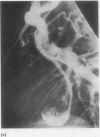Abstract
Superior vena cava to right pulmonary artery anastomoses have been constructed in 46 infants and children with cyanotic congenital heart disease associated with low pulmonary blood flow and low pulmonary vascular resistance. All children had lesions not currently amenable to corrective operative procedures. Good or excellent results, albeit with persistent mild to moderate cyanosis, followed operation in 31 children and have been maintained for up to eight years. There were 15 hospital and two late deaths. Although there has been a significant absence of late complications, it is probable that the caval anastomosis results in a fixed level of pulmonary blood flow and thus fixed effort tolerance. Thus, when puberty with its demands for increased physical activity occurs, these patients may require further surgery, such as a systemic to pulmonary artery anastomosis to increase pulmonary blood flow.
Full text
PDF





Images in this article
Selected References
These references are in PubMed. This may not be the complete list of references from this article.
- BAKULEV A. N., KOLESNIKOV S. A. Anastomosis of superior vena cava and pulmonary artery in the surgical treatment of certain congenital defects of the heart. J Thorac Surg. 1959 Jun;37(6):693–702. [PubMed] [Google Scholar]
- Bargeron L. M., Jr, Sterling Edwards W., 3rd The importance of an adequate circulating blood volume following superior vena cava--right pulmonary artery anastomosis. Surgery. 1965 Nov;58(5):865–868. [PubMed] [Google Scholar]
- Boruchow I. B., Bartley T. D., Elliott L. P., Schiebler G. L. Late superior vena cava syndrome after superior vena cava-right pulmonary artery anastomosis. Report of four cases. N Engl J Med. 1969 Sep 18;281(12):646–650. doi: 10.1056/NEJM196909182811204. [DOI] [PubMed] [Google Scholar]
- CARLON C. A., MONDINI P. G., DE MARCHI R. Surgical treatment of some cardiovascular diseases. J Int Coll Surg. 1951 Jul;16(1):1–11. [PubMed] [Google Scholar]
- Deverall P. B., Lincoln J. C., Aberdeen E., Bonham-Carter R. E., Waterston D. J. Surgical management of tricuspid atresia. Thorax. 1969 Mar;24(2):239–245. doi: 10.1136/thx.24.2.239. [DOI] [PMC free article] [PubMed] [Google Scholar]
- Downes J. J., Nicodemus H. F., Pierce W. S., Waldhausen J. A. Acute respiratory failure in infants following cardiovascular surgery. J Thorac Cardiovasc Surg. 1970 Jan;59(1):21–37. [PubMed] [Google Scholar]
- EDWARDS W. S., BARGERON L. M., Jr THE IMPORTANCE OF THE AZYGOS VEIN IN SUPERIOR VENA CAVA-PULMONARY ARTERY ANASTOMOSIS. J Thorac Cardiovasc Surg. 1963 Dec;46:811–817. [PubMed] [Google Scholar]
- GLENN W. W. Circulatory bypass of the right side of the heart. IV. Shunt between superior vena cava and distal right pulmonary artery; report of clinical application. N Engl J Med. 1958 Jul 17;259(3):117–120. doi: 10.1056/NEJM195807172590304. [DOI] [PubMed] [Google Scholar]
- ROBICSEK F., SANGER P. W., TAYLOR F. H., NAJIB A. THE AZYGOS "STEAL" SYNDROME IN CAVAPULMONARY ANASTOMOSIS. Ann Surg. 1963 Dec;158:1007–1011. doi: 10.1097/00000658-196312000-00012. [DOI] [PMC free article] [PubMed] [Google Scholar]
- WATERSTON D. J. [Treatment of Fallot's tetralogy in children under 1 year of age]. Rozhl Chir. 1962 Mar;41:181–183. [PubMed] [Google Scholar]
- Young W. G., Jr, Flemma R. J. The present status of the caval-pulmonary anastomosis. Dis Chest. 1966 Jul;50(1):87–92. doi: 10.1016/s0096-0217(15)33026-0. [DOI] [PubMed] [Google Scholar]





